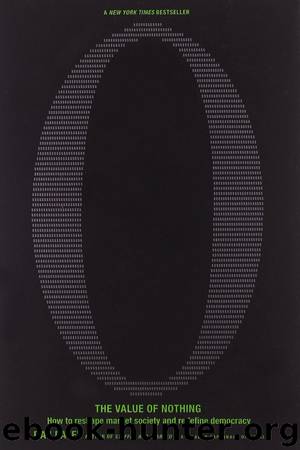The Value of Nothing: How to Reshape Market Society and Redefine Democracy by Raj Patel

Author:Raj Patel [Patel, Raj]
Language: eng
Format: epub
Tags: Business & Money, Economic Conditions, Free Enterprise, Politics & Social Sciences, Politics & Government, Ideologies & Doctrines, Nationalism, Specific Topics, Political Economy, Biography & History, Entrepreneurship & Small Business, Business, Economics, Theory, Capitalism, Non-Fiction
ISBN: 9781846272462
Google: IUq3mxntJGcC
Amazon: B0037UAC62
Goodreads: 19071280
Publisher: Granta Publications
Published: 2009-12-03T00:00:00+00:00
PART TWO
It’s one thing to know that everyone has a seat at the lunch counter, but how do we figure out how everyone can pay for the meal?
—BARACK OBAMA, Speech at the NAACP's Fight for Freedom Fund Dinner, 2005
(SEVEN)
THE COUNTERMOVEMENT AND THE RIGHT TO HAVE RIGHTS
Live free or die!
—State motto of New Hampshire
Give me liberty or give me death!
—PATRICK HENRY, arguing for rebellion against the British
There’s a poetry of choice, freedom and death that weaves through political rhetoric in the United States, past and present. It’s a language of frontiers and revolution, but its grammar fits the way capitalism sets the terms of value. At its heart beats the idea that private property and profit-driven markets provide one thing that no other system can: liberty. Commoning involves other people putting limits on what resources you can exploit, how much you can accumulate, how things will be shared. The free market has none of those constraints. Within it, you’re free to buy, sell, consume or produce whatever you like. With a walletful of cash and a pinch of entrepreneurial spirit, the world lies at your feet. There is no system more attuned to this version of liberty than capitalism. This soft power of the market, its ability to suggest liberty as part of exchange, is one of its most attractive elements.
When the Obama bailout plan mooted salary caps on bankers receiving public money, howls could be heard throughout corporate America—from the inhabitants of C-suites to the fresh-faced graduates who wanted one day to claim those corner offices for themselves. Without the liberty to be entrepreneurial and to receive adequate reward, they bleated, talent would leave the business. Given that it was such unleashed “talent” that had allowed the economic crisis to bloom, few tears were shed for their loss of freedom beyond the world of banking. But were they right, at least in theory? Does capitalism provide the most freedom?
The late Oxford philosopher Jerry Cohen concieved a thought experiment that helps us to understand how money works, and the way that it intersects with the liberty offered by free markets. When the market rations goods on the basis of money, he argued, there’s reason to quarrel with the idea that markets make freedom. Imagine that we live in a world where we have little tickets distributed at random. On these tickets are rights—the right to go visit your sick mother, the right to cross a particular road, the right to live somewhere, the right to eat a steak, the right to treatment for a disease and so on. You don’t have to do what’s written on any given ticket—they simply limit the extent of your freedoms. If you try to do something for which you do not have a ticket, the law intervenes. The tickets map out the degree to which you are free (or not free) to do something—they are a complete accounting of your liberties. The more tickets you have, the freer you are.
So here’s the twist: Money is just like these tickets.
Download
This site does not store any files on its server. We only index and link to content provided by other sites. Please contact the content providers to delete copyright contents if any and email us, we'll remove relevant links or contents immediately.
| Anarchism | Communism & Socialism |
| Conservatism & Liberalism | Democracy |
| Fascism | Libertarianism |
| Nationalism | Radicalism |
| Utopian |
The Secret History by Donna Tartt(18998)
The Social Justice Warrior Handbook by Lisa De Pasquale(12177)
Thirteen Reasons Why by Jay Asher(8873)
This Is How You Lose Her by Junot Diaz(6855)
Weapons of Math Destruction by Cathy O'Neil(6248)
Zero to One by Peter Thiel(5762)
Beartown by Fredrik Backman(5707)
The Myth of the Strong Leader by Archie Brown(5480)
The Fire Next Time by James Baldwin(5409)
How Democracies Die by Steven Levitsky & Daniel Ziblatt(5199)
Promise Me, Dad by Joe Biden(5127)
Stone's Rules by Roger Stone(5065)
A Higher Loyalty: Truth, Lies, and Leadership by James Comey(4937)
100 Deadly Skills by Clint Emerson(4898)
Rise and Kill First by Ronen Bergman(4757)
Secrecy World by Jake Bernstein(4726)
The David Icke Guide to the Global Conspiracy (and how to end it) by David Icke(4683)
The Farm by Tom Rob Smith(4484)
The Doomsday Machine by Daniel Ellsberg(4473)
